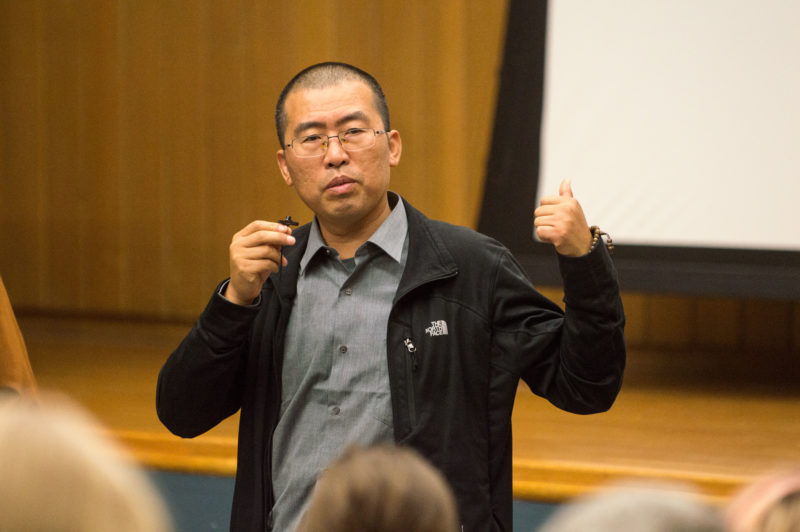A massive collaboration of 14 academic departments brought an award-winning documentary filmmaker and a leading Chinese journalist to campus for a conversation on environmental movements in China.
On Thursday, Nov. 2, the EAST Program “” short for East Asian Studies at Trinity “” hosted a screening of “Waking the Green Tiger” in Chapman Auditorium. Director Gary Marcuse and writer Liu Jianqiang answered questions afterwards.
The film, released in 2011, follows the joint effort of farmers, activists and journalists to prevent the construction of a massive system of hydroelectric dams on the Yangtze River. The resulting reservoirs of hydroelectric dams flood crucial ecosystems and swallow precious farmland, displacing entire villages built around agriculture.
Popular images from China don’t always depict lush countryside. Media is often inundated with urban landscapes, smoggy skies and everyday commuters wearing surgical masks. China is notorious for air pollution, coal consumption and mass manufacturing. Marcuse’s film shows the viewer that the “industry first and environment second” ideology is a cultural remnant of Mao Zedong’s industrial philosophy that “man must conquer nature.”
The institution of the Environmental Impact Assessment Law in 2004 gave Chinese citizens the right to impact the processes going on around them for the very first time. Under this law, long-term environmental impact must be assessed before breaking ground on any major construction project.
This legislation allowed for cautious optimism by the general public and gave citizen-run environmental groups the opportunity, theoretically, the right to work in the surrounding communities and raise awareness for potential environmental impacts.
The documentary introduces us to prosperous rural communities who stand to lose everything if they are displaced. Villages that have been relocated were given inadequate compensation and launched into poverty. Organization and communication had to occur quickly to save the farmland these villagers had worked in for generations.
“Waking the Green Tiger” ends on a triumphant note. Many villages were able to prevent the construction of hydroelectric dams and preserve their way of life through ceaseless activism and demonstrations. Environmental articles in the Chinese press number in the hundreds of thousands, and thousands more environmental groups have been founded to hold the government accountable for damage control and sustainable growth.
The collisions between government and environment, however, are far from over. Journalists risk losing their jobs or consequences as severe as prison time if their work crosses an unspoken line.
According to Marcuse, every five or so years a new round of proposals crop up for multiple new dams. Successful activists and demonstrators have to circumnavigate heavy police presence and diffuse tensions with armed soldiers.
“This success is very rare,” Jianqiang said after the screening. “There was another demonstration against a dam in the Yunnan province. It was cracked down on [by the government], some people were killed, and the huge dam project went forward anyway.”
This seems to leave a bleak prospect for any kind of activism, but Marcuse quickly offered up some interesting numbers.
“There are approximately 50,000 demonstrations a year throughout the country,” Marcuse said.
These demonstrations consistently see support from both rural agricultural villages and urban middle class citizens.
“One of the most impressive things they can do, is what they do when they feel like it,” Marcuse said.
Ecosystems that were stripped to dirt and bedrock during Mao Zedong’s industrial revolution have since been reclaimed by public replanting initiatives. Endangered species have been documented and protected. Wind turbines are installed at a rate of nearly one per minute.
Green movements are on the rise in China, but not without immense struggle.







